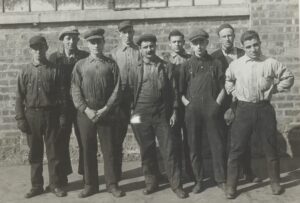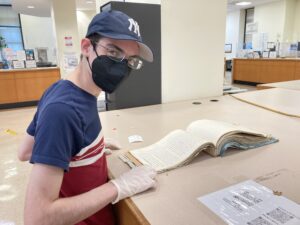World War I did not stop an army of laborers, who were helping the war effort, from going on strike and seeking better wages, working conditions, and to unionize. Meet the shoemakers of the Rosenwasser Brothers, a factory which was chiefly aiding soldiers during the Great War. Many of the workers, in the midst of this demanding time, seized the opportunity to press their factory owners for concessions.
Justice Townsend Scudder, who served as judge on the case that the owners of the Rosenwasser Brothers brought against the union organizers before the New York Supreme Court, described in his ruling the aggressiveness of the picketers: “The factory and vicinity thereof became the scene of disturbances, violence, coercion and intimidation.” He also found that the strike conducted by these essential wartime workers had an impact, since “the output of the factory has been reduced to about one-fifth of its former production.”

A meeting took place in August of 1917, during which everyone joined the union prior to the strike. Scudder noted that “for the most part the men were Russian or Polish Jews.” The reason why I came across this exemplary case of early labor activism is because I found, in my genealogical research, that my great-great grandfather Jacob Weintraub worked as a shoemaker for the Rosenwasser Brothers around this time. But was he at this meeting? Did he boldly join the picketers during these uncertain times? Or was he one of their most ardent opponents? I needed to find out!
Scudder wrote that “the testimony taken covers more than 5,000 typewritten pages.” It seemed to me that somewhere among these many pages in the case file there could possibly be mention of my ancestor.
Last year, the Queens County Clerk’s Office, whose jurisdiction this was in, returned my call and told me that they could not find a record of the case. (I suppose they do not receive requests very often for case records from 100 years ago.) My disappointment was short-lived though, because the next day they left a voicemail: “We have the file here. We have located it.”
Staring blankly at the traffic ahead as my dad and I ventured to Queens, I wondered if this was a silly endeavor. What are the odds that my ancestor would be mentioned, anyways? But it seemed like so many pages — just maybe there is some mention of a “Weintraub.” Even just a footnote could tell a remarkable story.
I met the office worker who spoke with me on the phone, and she handed me the case file. It was not as big as Scudder had mentioned, and it seemed to not include all of the testimony, but rather affidavits and other filings. I flipped through the pages, scanning to see if there is any mention of Jacob Weintraub. From what I could find, there was not. But I found the next best thing.

Skimming the pages, my eyes lock onto the surname “Weintraub” — Jacob’s brother Louis Weintraub, who from what I knew had also worked at the factory during this time. Louis submitted an affidavit. But what side was he on?
“I have been in the shoe making trade since I was twelve years of age,” Louis wrote. “I know the shoe making trade from A to Z.” Having established authority and credibility by underscoring his experience and knowledge of the business, he proceeded to argue his point: “From my knowledge of the shoe making trade, the wages and prices paid by the Rosenwasser Bros. are the lowest of any shoe factory in the City of New York, or in any factory in the State of Massachusetts where most of the shoe factories are located.”
He goes on to say: “My co-employees and myself went out on strike for the simple reason that the wages paid by the above named plaintiff were absolutely insufficient to support ourselves and our families.”
Of course, this is only one snapshot in time. Considering how the case lasted for another year after his testimony and was full of developments, we cannot be certain how one may have felt at various points. It is also not clear to me how Louis might have viewed the further step of pushing for unionization.
But one thing is for sure. Louis Weintraub, my great x3 uncle, not only went on strike in the midst of the Great War, which was undoubtedly a bold move. This affidavit suggests that he was also an impassioned supporter, perhaps even a leader, in the effort. With so much news about strikes, it is fascinating to learn how Louis represented a much earlier precedent for labor rights activism.
But what about Jacob? For the most part, this remains a mystery. Was he supportive of, or a participant in, the shoemaker strike? Maybe. Was he a fierce opponent of his brother’s efforts? Probably not.
As for Justice Scudder’s ultimate ruling, he chastised the union organizers — the ones who sought the shoemakers and compelled them to join. He felt they were acting in bad faith. “The prices and working conditions were of secondary importance,” he observed, for in the eyes of the organizers these “could readily be adjusted” after the factory contracts with the union.
After directing us to various concessions that picketers won from the Rosenwasser Brothers, Scudder concluded that “to incite the employees to strike merely for the purpose of promoting the private organization interests of the union is, under the circumstances, wicked.”
Scudder felt that during this Great War in which the shoemakers are essential workers, it is entirely inappropriate to strike — all the more so for the agenda of unionization, which is not directly related to the pay and working conditions.
The verdict: “Strikes for any cause whatever to be enjoined for the duration of the war.” How interesting it would be to be able to talk to Louis about his thoughts on this outcome.